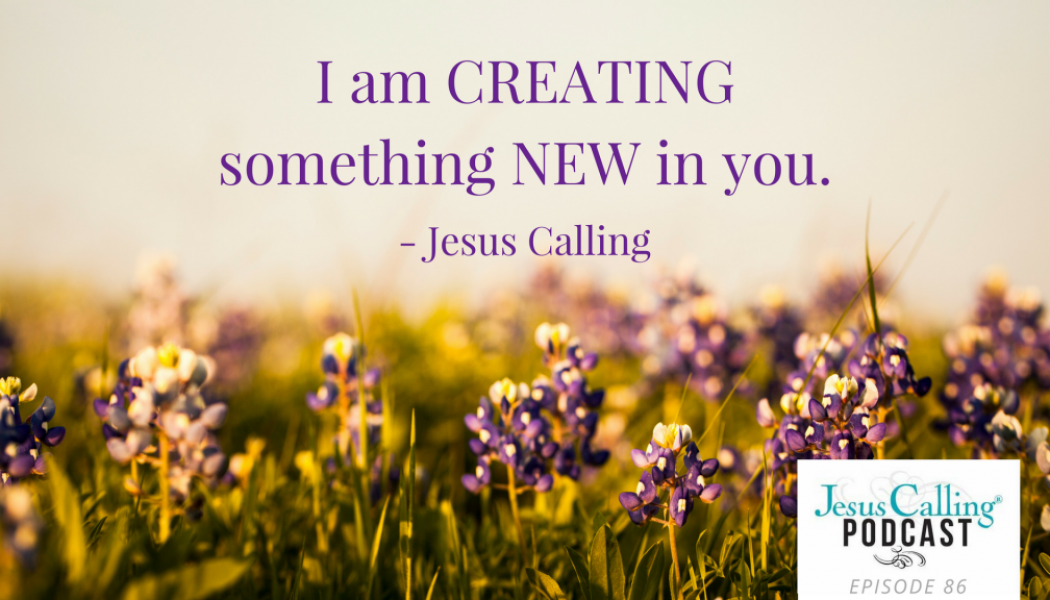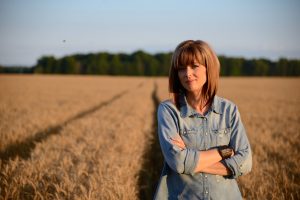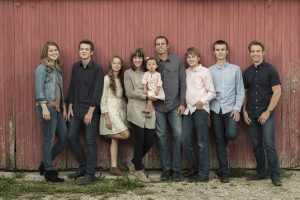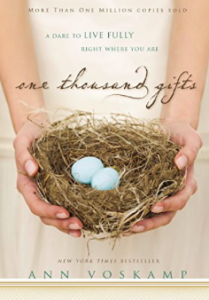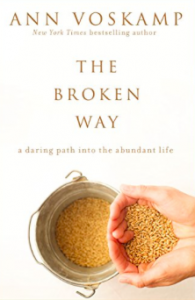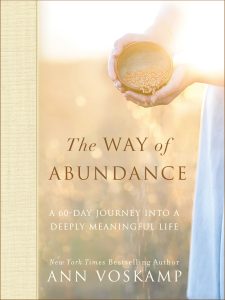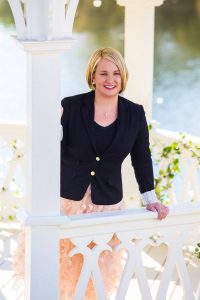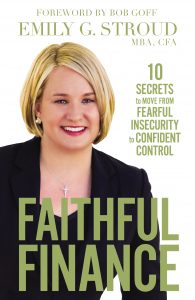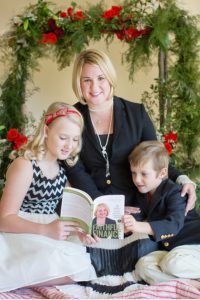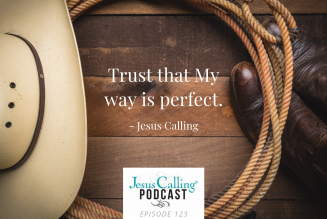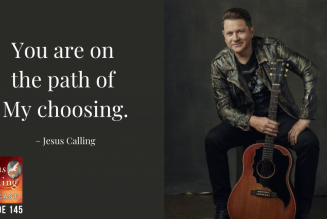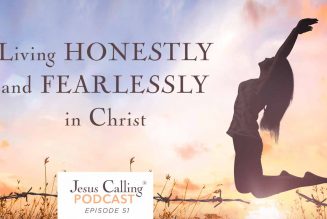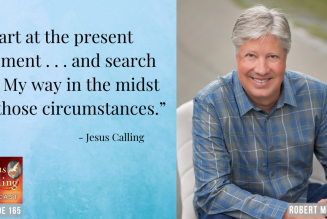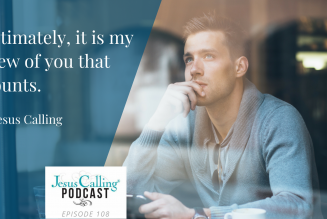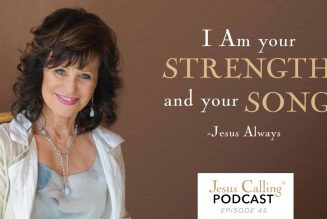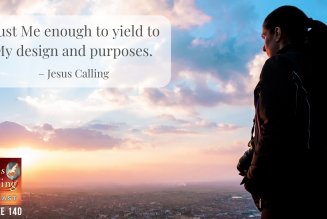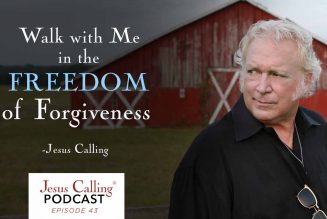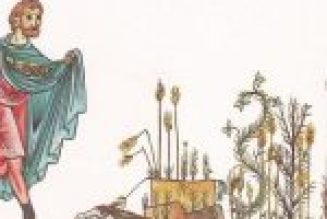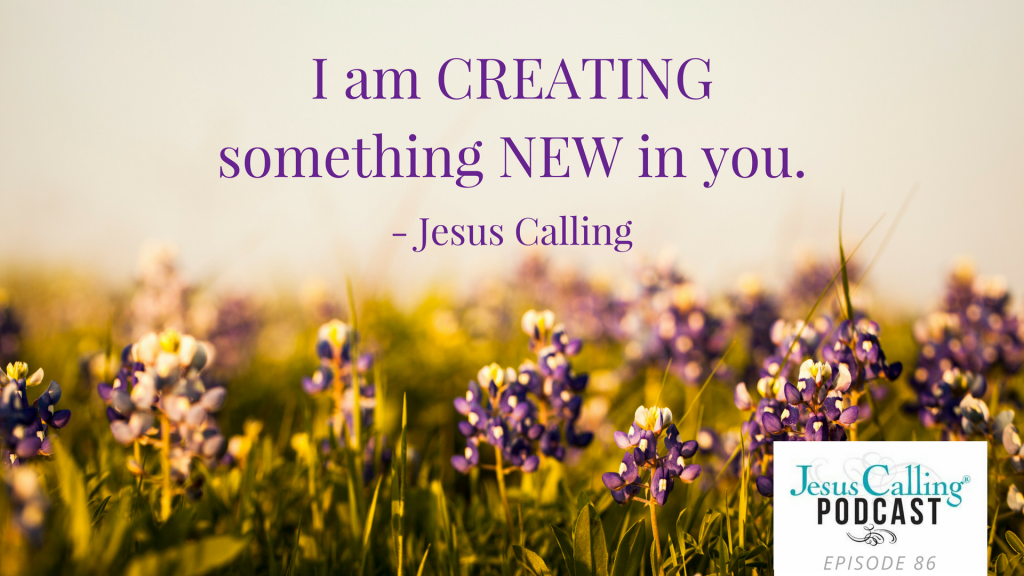
Ann Voskamp is the New York Times bestselling author of Be The Gift, a book that challenges and encourages us to listen to God and look for opportunities to be His gift to others. Her latest book, The Way of Abundance shares personal stories about how we can find God’s faithfulness and hope, even while we’re suffering. Our second guest is financial planner and author Emily Stroud. She shares how financial mistakes don’t have to define us, and gives hope for faithful financial futures.
The Broken Road to Joy: Ann Voskamp & Emily Stroud – Jesus Calling Podcast Episode #86
Narrator: Welcome to the Jesus Calling Podcast. Ann Voskamp is a mom, writer, teacher, speaker. Her book 1000 Gifts explored what it would be like to be grateful every day. Her newest book, the Way of Abundance talks about how joy can still spring from brokenness and suffering. She shares stories from her own life and urges us to drop our masks of perfection and embrace our scars, as our scars identify us with Jesus.
Waiting on The Lord
Ann: My name is Ann Voskamp. I am married to a farmer. We have the grace and “wild crazy” of seven children from 22 years old down to three years old. Four boys and three girls. Our littlest is from China. Shiloh has been with us now — it’ll be two years this April, and I struggle with saying I’m a writer because that’s never what I say. I always say I’m a waiter. I wait on the Lord, and it’s a slow listening to just whatever He lays on my heart. So I have written, I guess now, four New York Times bestsellers, and my latest book The Way of Abundance comes out March.
I grew up only about 15 or 20 minutes away from the farm we live on right now. My very first memory was when I was four years old, and my 18 month old sister was crushed and killed before my mom and I from a farm service truck in a farm accident.
I had nightmares as a child. I was terrified of death, and I was diagnosed with an ulcer by the time I was 7 in grade 2. By the time I was in my teen years, I was cutting, and by the time I was 18 or 19 years old, I was diagnosed with agoraphobia, panic attacks. The world was a terrifying place for me where there was not only diagnosis and suffering, but a really violent death could slam up against your face at any moment.
“Everything in my life I was afraid of – I was terrified of suffering.” – Ann Voskamp
I was terrified. Everything in my life I was afraid of. I was terrified little broken thing. I was terrified of suffering.
So for me, it’s really been trying to process anxieties, and fear, and suffering, and pain and what do you do with these things? One of the things I was really looking at was fighting that fear and anxiety and suffering. Can I give thanks in everything—through everything?
I was always a writer and a journaler. I always considered it sort of a handicap. I didn’t really understand my life unless I could write it all down and see how all the pieces fit together. As a kid I wanted to go to school or to university to look at law or journalism or teaching. I just loved learning and books. So actually, I graduated high school at the top of my little high school class and received a scholarship to university, and I was in a concurrent education program and a child psychology program. I wanted to teach, but even more so than teaching, I really wanted to understand: “How do we learn,” and “how do we retain information?” I was really interested in curriculum development and I was teaching in downtown Toronto. I just love teaching little kids. We had a multi-split classroom, kindergarten through age two, and I fell in love with those kids. I just really enjoyed teaching. Then, at the end of my second year of university, I got married to my farmer and was continuing with my program.
“I didn’t really understand my life unless I could write it all down and see how all the pieces fit together.” Ann Voskamp
My husband and I were both born in the same hospital, in the same room, in the same hospital, with the same doctor. So we are going to be born, live and die in the same place. But I think there’s a real grace just to be in a place where you’re rooted.
I was raised on a farm. I come from the seventh generation of farmers in my family, and my husband’s family is farmers as far back as their family goes. So this is all I’ve ever known. I knew when I was a little girl that I only wanted to marry a farmer. I loved big sky and wide open fields. I love putting in a crop, and taking off a crop, and the harvest.
I came home and Caleb was born in May of that year, and I decided I couldn’t leave this little baby, so I moved my courses over from York University in Toronto to the University of Waterloo and took distance education.
I always thought Joe and I would get married; we’d figure out where I was going to teach; we would buy a farm; and he would farm and I would teach. That was always the plan. So me coming home and having kids and ending up teaching those kids wasn’t far from the plan. There wasn’t anything I loved more. I always felt like as long as you had a good library card, I could sign about a hundred books out of the library every two weeks, and I would spend hours and hours and hours reading to the kids.
One Thousand Gifts
Really, that’s where I came to writing was; I started to write curriculum for the kids—geography curriculum about the whole earth and its glories. That’s really where I started was just loving reading to the kids, and I was just curious about the world, and I wanted them to be curious and interested in the world. I really believe education isn’t about filling a bucket with information as much as it is igniting a match; lighting a match of curiosity and passion for the world. That was what I really wanted to instill in our children, and that’s how my own heart burns, so my writing really just came out of that very naturally and organically.
When I first started blogging, I didn’t have comments; it wasn’t about networking; it really wasn’t about creating a — I struggle with that word—“platform.” I think Christians have altars and not platforms. The Bible says, “Make our lives a living sacrifice.” So it wasn’t about any of that at all, and I just thought, “Well, you know, these are things that I’m struggling or working through in my own life, and I’m going to have it as an online journal. If anyone stumbles across this and it blesses them, to God be all the glory.” Sometimes as a mom and a wife, the work that I was doing sort of felt like water through my hands. I’d get up in the morning and wash dishes, and school the kids, and make the next meal, and I would get up the next day and do the same thing again. Writing the stories down, I always said was sort of like canning up the summer of my life for the winter of my life, so that I could go back and read the stories again of God’s faithfulness.
That’s really just where I started. One of my friends, another homeschooling mom, had dared me to write down a thousand things I loved. And as I started to do this, I realized, “I’m writing down a thousand ways God loves me. I’m counting all the ways God loves me.” It began to profoundly change my life. I realized that joy is a function of gratitude and gratitude is a function of perspective. No matter what the situation was, could I change my perspective and see that there is always, always, always something to be grateful for? I had struggled a lot with anxiety and realizing that you can’t simultaneously feel anxiety and gratitude. Sometimes we need… sometimes there’s medications that we need to help us with anxiety, but sometimes the answer to some anxiety can be the adoration of Christ. Could I live in this posture of constant gratitude, really, as a weapon to fight back worry and fear and anxieties? It profoundly changed my life, and I was just writing out those stories journaling online.
One Thousand Gifts just came out of me processing a lot of my own pain and how gratitude really came back to the Lord’s Supper and how Jesus, at the Lord’s Supper, took the bread — which was really the bread of suffering, the bread of the cross of what was coming before Him — and He gave thanks.
And I just realized, “If Jesus could give thanks in that, I could give thanks in anything.” And so One Thousand Gifts is the story of how gratitude radically changed my life.
Gratitude and God’s Grace
Sarah Young’s pastor is a very close friend of mine, and he surprised me when I was going to his and his wife’s house to have dinner one evening. He said, “We are going to stop off. There is somebody who would just really like to see you.” And we stopped at Sarah’s house and had about an hour with Sarah, and I just love her heart for Jesus.
And she’s right. We are wired to worship something, and if we don’t intentionally choose to worship Jesus moment after moment after moment, there will be idols that will beg us for their worship. Gratitude is this… I mean we sometimes we think of gratitude as “I’m generally a grateful person,” but how do we go ahead and cultivate a default of gratitude? In my life, my default was not gratitude.
“…if we don’t intentionally choose to worship Jesus moment after moment after a moment, there will be idols that will beg us for their worship. “ – Ann Voskamp
“How can I perform better?” My default was driving as opposed to resting in God’s all sufficient grace.
Giving God Our Brokenness
I think a lot of times we can read scripture. We can go to our faith communities, our houses of worship on Sunday mornings, and we can listen to a sermon. The theology, though, that doesn’t birth itself at the kitchen sink, is a “stillbirth” theology. Somehow, we have to figure out; “how do I incarnate what I believe? How do I put skin and flesh on that?” Lots of times people ask, “What kind of Christian are you?” Or “What kind of believer are you?” I really say, “I’m an incarnationalist. I want to incarnate the Gospel “— not just that it’s something that I cerebrally understand or think about or even articulate — but how do I embody it and live it out moment by moment? That, honestly, is really, really messy.
What if we were really raw and honest and vulnerable and we took off the mask of our perfectionism and said, “I am broken, but can I tell you about a Wounded Healer who is all my sufficiency and who puts me back together?”
So it’s a sacred exchange, and I think, not only do we do ourselves a great disservice, but we do the world around us a great disservice when we are not vulnerable and honest about our brokenness, because they see our hypocrisy. I think, ultimately, what we want, is deep intimacy and relationship with other people. You don’t get to intimacy without taking up that broken way of vulnerability and humility.
I had this epiphany, really, for me, that it wasn’t about practicing the presence of God. I need to practice the presence of being attentive because the presence of God is everywhere, and I don’t want to waste suffering by wasting my attention. So how can I be attentive to the presence of God in this moment because ultimately, wherever God is leading me, He’s leading me closer to Himself.
This summer, I found myself in the hospital with heart failure with post-operative pneumonia. My lungs are filling up with fluid, and my heart was failing, and I’m just not in a situation you expect to find yourself in in your early 40s. Nor did the doctors. So really, processing it, for me, was sort of this moment of late night; I’m not sleeping; finding it hard to breathe; realizing my heart is failing and looking at my own failures, generally, in my life and bringing them to the Lord.
For me, it really was realizing, laying in the hospital bed, that suffering can be a friend who drives you where you didn’t know you needed to go. That process of hospitalization, for me, really was that I needed to come much closer to Jesus. What did He want me to do? This whole life detour really meant that God wanted me to run right into His arms so He could reconstruct my heart. For me to look at my own failures — and sometimes when it feels like everything is falling apart — maybe we’re just really falling into the arms of God. That was what that experience for me really was about.
In Suffering and In Joy, Jesus Is There
What do you do with your failures? What does it look like when you feel like a failure? It really was coming to: “Okay, Lord, what if my heart does fail here, and this is the end of my life, and I look back at my life, and what I do with it?” I mean, we all have this closet of regret about not only things we have done, but actually studies show that the greater regrets in our lives are for the things that we didn’t do, the things we have left undone. Just really realizing that without Jesus, our heart does fail.
“…we all have this closet of regret about not only things we have done, but actually studies show that the greater regrets in our lives are for the things that we we didn’t do..” – Ann Voskamp
I think that there’s such profound comfort in knowing that His name is Emmanuel, God with us. We may not understand the purpose or the point in our suffering, but whatever it is, it must be so important, and so profound, that Jesus himself is willing to go through that suffering with us. We don’t ever cry alone. Jesus walks with us and experiences that suffering with us, and so many times, we say… we think we want an answer to : “Why the suffering?” Really, answers can be really cold.
God’s Ways Are Higher
What we really want is to know we’re not alone in the suffering. We really want more than an explanation. We want an experience of God in that suffering. We want to know He is with us in the suffering. As I talk about in The Broken Way and in this next book, too, The Way of Abundance, “withness” is what breaks brokenness. God with us. We are not alone in that brokenness in the answer to so much of the suffering in the world is “withness.” Will we have compassion which literally means co-suffering? Will we have the compassion to co-suffer with other people? I think sometimes we think that if we could just have a life without suffering, we would have a life of joy. Joy is not the absence of suffering in our hands. Joy is; how do we handle suffering in our hands?
For our perspective, I mean, the suffering sometimes is incomprehensible. Suffering is evil, and I think for us to realize that we need an other-worldly type of love to overcome that kind of evil; a love that is actually cruciform. Jesus himself absorbs that evil through his suffering on the cross. Then we also should understand that sometimes God allows what He can hardly stand for purposes that we can’t understand. His ways are higher than my ways, and ultimately, God himself is a mystery.
Sometimes, I look at the suffering, and I say, “What is this God? I don’t understand but trust that in the midst of what I don’t understand and what appears to be a mystery to me, God himself will sustain me.”
“I look at the suffering, and I say, ‘What is this God? I don’t understand but trust that in the midst of what I don’t understand and what appears to be a mystery to me, God himself will sustain me.’” – Ann Voskamp
I think I’ve come to understand through writing The Broken Way and The Way of Abundance, I was terrified. Everything in my life that I was afraid of was… I was terrified of a broken thing.
God Redeems All Things
Do not be afraid of broken things. God is redeeming everything. If I wasn’t afraid… We’re so afraid of the suffering of death. We’re so afraid of of the Good Fridays in our lives. We’re so afraid of carrying the cross to places like the Via Dolorosa, the way of suffering. And being so afraid of those places makes it so we never get to the places of resurrection, the abundant places, the places where God takes all the brokenness–the abundance of brokenness–and now makes that into a mosaic of grace that’s for our abundant healing and wholeness.
We think the way of abundance means I need to avoid the way of brokenness and realizing that, “No, I find the way of abundance through my own brokenness. I need to stop running from it and realize that God wants to bring me abundance through it.
“I find the way of abundance through my own brokenness.” Ann Voskamp
We don’t have to be afraid of our own brokenness or our own failures. We are actually falling into His arms, and we don’t have to be afraid of failure because Jesus’ arms never fail.
Our scars, our brokenness is what we sometimes want to hide and mask, but those scars identify us with Jesus’ scars. Those are courage, and they are our “brave,” and we don’t hide them. We share them, because it gives Christ all the glory, and because by His wounds we are healed.
To find out more about Ann’s book, The Way Of Abundance, please visit AnnVoskamp.com.
Stay with us for the second half of our program after this brief message from Audible.
Audible Message:
Faithful Finance with Emily Stroud
Narrator: Our next guest is Financial Advisor, Emily G. Stroud. Emily helps people think about their future, not just in terms of wealth, but in terms of living to our fullest potential. She helps us sift through being faithful in our finances and offers up hope for any of us who struggle with financial woes.
Emily: My name is Emily G. Stroud, and I live in Fort Worth Texas. I’m a Financial Advisor and CFA, which is a Chartered Financial Analyst. I am a wife and mother. I have a daughter who is 11 years old and a son who is 7 years old. We live in a farmhouse on about eight acres just outside of town, and I own and manage a boutique investment firm called Straub Financial Management here at the farmhouse. We have clients out all the time, and we sit around a farm table, and we talk about their goals and their dreams and their fears and how we can help them make proactive long term strategic financial decisions that will help bless them and bless generations to come. My goal is that my clients always leave more refreshed and more at peace than when they first arrived.
I was born in Fort Worth — which is where I live now — and then, when I was just about to start kindergarten at the age of five, my father moved our family to Dallas, which is only an hour away; but the culture is very different. It is much more cosmopolitan than Fort Worth, and that is where I actually grew up during all my formative years.
I’ve been a little introspective lately, wondering about how I ended up where I am when I started thinking about my childhood. My father started his own business in Dallas. That was why we moved right before I started kindergarten, so I was very young. We would go up to his office after school. My mom would take us up there — and on weekends, he’d be working — and, believe it or not, when I was in about 2nd or 3rd grade, my dad let me start filing for him because I was always very analytical and detail oriented even from a very young age. And I loved it. I would pretend that it was my office, and I would pretend to answer the phone and shuffle papers around. I just thought I was playing, but looking back, I think I always really enjoyed the business world, the environment. My dad was very open with my brother and I because he was his own business owner. He would tell us about how business worked and what things cost us and how expensive it was to live. And sometimes we could have things that were new, and sometimes he would say, “You know what? We just can’t afford that right now.” So my parents were actually pretty open with my brother and I about finances, which now I know as an adult is not always the case by any means. So I did learn a lot from my parents and from my father in particular about how to run a business and what it really took to withstand the ups and downs of the economy.
I saw the glamorous, great parts when the economy was going well and sales were being made, and I also saw the stress that my father went through when the economy went down, and when he had to lay people off, and when he wasn’t quite sure how he was going to pay the mortgage that month because things were really really tight.
Helping People Navigate Their Finances
I definitely worked in high school. My parents provided all of the necessities, but if I wanted a new bicycle or a new pair of skates or the latest prom dress or something like that, they definitely made me work and have what I call “skin in the game.” So I learned the value of a dollar. They did not just give me anything that I asked for. And at the time, I thought it was so annoying, but looking back, I can appreciate what a good job they did as parents. Then, while in college, they paid for my undergraduate tuition and room and board — which was a huge gift.
When I decided I wanted to get my MBA and further my education at TCU, my father said, “Wonderful! You’re on your own now.” Which, at the time, was almost devastating because I thought, “How in the world am I going to survive?” But, you know, necessity is the mother of all invention, and I learned more in those two years about how to support myself and be scrappy. I got a scholarship that I applied for because I was motivated to survive. I worked a job on campus, and I had an internship, and I worked in the summers and holidays. It was tough.
But when I came out of graduate school, number one, I had work experience because I ended up working for American Express Financial Advisors — which is when I really fell in love with personal financial planning for individuals and not corporations. So that was really great. And I don’t know that I would have taken on another job in full-time graduate school had I not been forced to look for a job to support myself. Then when I came out, I had a great idea of what I wanted to do.
I think people are afraid to talk about money because at some point in the culture, we were taught that religion and politics and money were the topics that were not supposed to be brought up in polite conversation. Some of that stigma has been passed down where people just don’t talk about it. Secondly, we live in a culture of credit cards, and we really can get whatever we want right now regardless of whether or not we actually have money in the bank to pay for that item, so we don’t have to have delayed gratification. We can get what we want now. That is how a lot of people end up with a mountain of stuff and a load of debt that they can’t climb out of.
If they haven’t been taught — people that don’t have a cash reserve which is for emergencies — then they’re always one paycheck away from bankruptcy or using credit cards to make ends meet. There’s no proactive approach to their financial planning. It’s all survival mode in the here and now. That was one of the reasons why I wrote my latest book Faithful Finance: 10 Secrets to Move from Fearful Insecurity to Confident Control because after 20 years of counseling people about how to manage their money, I have found that everybody has an issue with money. It doesn’t matter if their resources are plentiful or if the budget is really really tight. Everyone seems to have some sort of issue or fear related to money.
“After 20 years of counseling people about money, I have found that everybody has an issue with money.” – Emily Stroud
The book is titled Faithful Finance, and it has two meanings. From a spiritual standpoint, faithful means I seek God first before I make decisions. I ask Him for wisdom and guidance, and then I move forward. I don’t buy something and then ask Him to bless it later. So it’s about putting God first in your life. But from a secular standpoint, “faithful finance” also means I do something regularly, systematically, and religiously. I save religiously every month. I pay myself first. I pay my credit cards off every month. I consult my budget every month. I think you get the idea. It’s something that you do without fail on a regular basis.
I have found just having a plan in place immediately changes people’s countenance. They relax. They feel more peaceful just knowing there’s a strategy and there’s hope and there are things they can do. It usually radically changes people, and it also really helps and strengthens couples that are married where this is a huge source of tension between them. When we talk about it, and I’m not unbiased third party, I find that we’re literally changing marriages.
If the cornerstone are the backbone of our country is the family, and the families breaking down, and people are divorcing… if we can save marriages and can keep nuclear families intact, I feel like we’re really making a difference in the world. Everybody has money, so this isn’t something like you can just escape the idea and we just won’t deal with that. In our world today, you have to have money to buy food and clothes and shelter, and so it’s something that everyone has to deal with.
What the Bible Says About Money
There is this stigma — especially in the Christian arena — that money is evil, and that could not be further from the truth. The love of money above all else — above God and family — is evil. But honestly, the Bible talks about best practices for how to manage your money. So this stuff is not new information. I haven’t reinvented the wheel. God talks about money, and He loves to bless us. I’m not talking a prosperity gospel by any means, so please don’t misunderstand me, but if we are faithful with our resources — and we tithe, and we give, and we save — then we will be blessed because, number one, we’re not going to live in such a state of fear. If nothing else, we’re living in a state of peace as it regards our finances. And also, there’s people all around the world that are being the hands and feet of Jesus on the ground doing their ministry work. Well, what do they need to keep going? Oftentimes, it’s money. So we can’t all be in Uganda building schools and that sort of thing. But from my little house in Fort Worth, Texas, if I’m being faithful with my money, and I can support that person or missionary or whoever it is that’s over there in Uganda, that is just as important as the person that’s actually there on the ground. So we can use money to change the world. It is a tool to bless our families and to bless others.
“…if we are faithful with our resources — and we tithe, and we give, and we save — then we will be blessed…” – Emily Stroud
I think prayer should be the first step in making financial choices. A good example is I recently remodeled this farmhouse that we live in, and the windows that were delivered were the incorrect windows, but we didn’t have time to replace the windows and get the correct order. This is a first world problem, but I have never liked these windows. So I had someone come out yesterday to give me a bid on what it would cost to replace the windows, and it was ridiculous. It was not in our budget. There is no way we could afford these windows, but I was in my mind trying to justify. “I wonder if I just move things around a little bit and do this, that, and the other…” I was doing exactly what I tell people not to do.
I spoke to my husband after work, and he was like, “That’s crazy. We do not need these windows.” And I said, “You know what? You’re right.” And I had started praying about it, and the Lord was saying, “You don’t need these windows. Why don’t you be grateful for the fact that you have windows in your home?” So I had to refocus my thoughts, and I was kind of ashamed of myself because I was really spinning in my mind about how I was going to afford these windows that I didn’t really need, but I just wanted. So if I had prayed about this even earlier in that decision making process, it would have been more clear that that was not something that we needed to focus our finances on, by any means.
It was just something I wanted, not really anything I needed. Honestly, if you can pray first and then act, things always go a lot better.
Spending Time With Jesus Daily Builds a Firm Foundation
About a year ago, my mother and father sold the house that I grew up in in Dallas, and they actually moved to an assisted living facility here in Fort Worth. They’re able to be independent there because they have help. My dad is tremendously involved in taking care of her, so that’s also a burden on him. But she still has a good attitude, but every year the memory fails a little bit more. It’s just a tough situation.
My sweet mom is the one who gave me my first copy of Jesus Calling. I think I was in my mid 20s. I was out of graduate school, but I was definitely a young adult. I was looking for a devotional that was short but very effective — something that was practical that would give me some spiritual guidance, and something that I could do every day. So she gave it to me as a gift. I don’t even think she knew that was something I was looking for, so that was really neat. And then I started to read it every day, and it seemed to be so interesting that, every day, it seemed like the devotions were talking just to me as if God was speaking to me and telling me exactly what I needed to equip me for that particular day. And I just fell in love with Jesus Calling, and I would also use it as a chance… when I’d read the devotional, I would also read the scripture in my actual Bible that they referred to at the end of each devotion. What I found is that I would look up the verse, but I would usually end up reading the whole chapter or something else would come up, and so it can it basically became a format for my daily devotion.
Fast forward to now, and my sweet mom has dementia. I still keep a copy of Jesus Calling on my night stand, and it reminds me that she still is passing on her legacy of prayer and faith to me through that book. It really is a special thing to me because it always reminds me of my mom.
Looking Financially Forward; Letting Go of the Past
The most loving thing you can do if you are responsible for taking care of family members is to have the right amount of life insurance, the right amount of disability insurance for if you are ever injured or become sick and can’t work, but you still need to support your family. Then, I also talk about long-term care insurance, which often gets overlooked, and people think it’s a frivolous expense. But I have seen firsthand the difference it has made in my parents lives to have that long-term care insurance, and how, now, it is paying for their living expenses and taking care of them. They are so much better off than they ever would have been if they had not bought that insurance when they were in their early 50s, before either one of them had significant health challenges.
Honestly, it really doesn’t matter how much money you have. Everyone can benefit from wise counsel. This book actually outlines the 10 best practices which we call “secrets,” and we write it in such a way that there’s no shame. There is no condemnation that, “Oh, my goodness. You’ve made bad choices. Now there’s no hope for you.” And that seems to be the message in the media right now, which is very shaming, and that doesn’t help anybody. So we just want to give people practical information. And we do also provide that information with a biblical worldview.
I have never met anybody that’s a hopeless case. There is always hope, and there is always something practical that we can do. There’s no such thing as hopeless in this world.
In His mercy, He just pursues us. And I learned early on that money will buy happiness, but it does not provide lasting joy.
Narrator: To hear more about Emily’s book Faithful Finance, visit EmilyStroud.com
Narrator: Next time on the Jesus Calling podcast, we talk with Lysa TerKeurst. Lysa is president of Proverbs 31 Ministries, and the New York Times best-selling author of Uninvited, The Best Yes, Unglued, Made To Crave and 16 other books. She talks about her new book; Embraced: 100 Devotions To Know God Is Holding you Close.
Lysa TerKeurst: I think what Embrace will do for people is bring them back to that core reason God created us—and that was for intimacy with Him. If we can believe that God is with us, then we truly will feel a closeness with Him, and fears will dim in the light of His presence; our anxiety will dim in the light of His presence. Most importantly, drawing them into intimacy with God that will help a lot of the struggles that they’re having. They’ll have a better perspective in the midst of it all.
Narrator: This week’s featured passage comes from the June 13th entry of the Jesus Calling audiobook:
“I AM CREATING something new in you: a bubbling spring of Joy that spills over into others’ lives. Do not mistake this Joy for your own or try to take credit for it in any way. Instead, watch in delight as My Spirit flows through you to bless others. Let yourself become a reservoir of the Spirit’s fruit.
Your part is to live close to Me, open to all that I am doing in you. Don’t try to control the streaming of My Spirit through you. Just keep focusing on Me as we walk through this day together. Enjoy My Presence, which permeates you with Love, Joy and Peace.”
Start your day with the Peace found in His Presence through select excerpts from Jesus Calling® and other titles from Sarah Young, sent in a FREE daily e-mail right to your in box. For more information, Click here.
SaveSave
SaveSave
SaveSave
SaveSave
SaveSave
SaveSaveSaveSave
SaveSave
SaveSave
SaveSave
SaveSave
SaveSave
